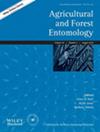How aphids fly: Take-off, free flight and implications for short and long distance migration
IF 1.8
3区 农林科学
Q2 ENTOMOLOGY
引用次数: 0
Abstract



蚜虫是如何飞行的?起飞、自由飞行以及对短途和长途迁徙的影响
介绍了高速摄影及其对昆虫学的影响,强调了高帧率和高分辨率的重要性。使用高清高速摄影技术研究了 Drepanosiphum platanoidis 和 Myzus persicae 在静止空气中的起飞和自由飞行。对翼尖和身体姿态进行了跟踪,以显示它们在每个拍翼周期中的位移情况。对翅膀的重要结构元素进行了描述。翼搏由加强型前缘、翼柱头和翼肋驱动。耦合的前翅和后翅的其余部分就像一个单一的气膜,由于脉络稀疏和缺乏横脉,在飞行过程中会发生变形。在飞行过程中,蚜虫使用 "近似拍打和甩动 "的机制,身体俯仰接近 90°。围绕胸部侧轴快速加速,使翅膀反转,从而产生足够的升力,通常在第一或第二次拍翅时就能起飞。独特的镜头显示,蚜虫在实验室中表现出高度的飞行控制能力和机动性,偶尔会使用前飞和倒飞这两种鲜为人知的飞行模式。虽然还需要对湍流对流的影响进行研究,但我们认为,大气力量的强度对蚜虫迁徙是一个巨大的挑战。在飞行边界层上方,迁飞的蚜虫可能不容易对抗向上运动的空气,尽管如果使用 "冷冻飞行 "可能会使它们平均下降。我们评估了用于昆虫飞行研究的五种装置。
本文章由计算机程序翻译,如有差异,请以英文原文为准。
求助全文
约1分钟内获得全文
求助全文
来源期刊

Agricultural and Forest Entomology
农林科学-昆虫学
CiteScore
3.60
自引率
6.20%
发文量
66
审稿时长
>24 weeks
期刊介绍:
Agricultural and Forest Entomology provides a multi-disciplinary and international forum in which researchers can present their work on all aspects of agricultural and forest entomology to other researchers, policy makers and professionals.
The Journal welcomes primary research papers, reviews and short communications on entomological research relevant to the control of insect and other arthropod pests. We invite high quality original research papers on the biology, population dynamics, impact and management of pests of the full range of forest, agricultural and horticultural crops.
 求助内容:
求助内容: 应助结果提醒方式:
应助结果提醒方式:


